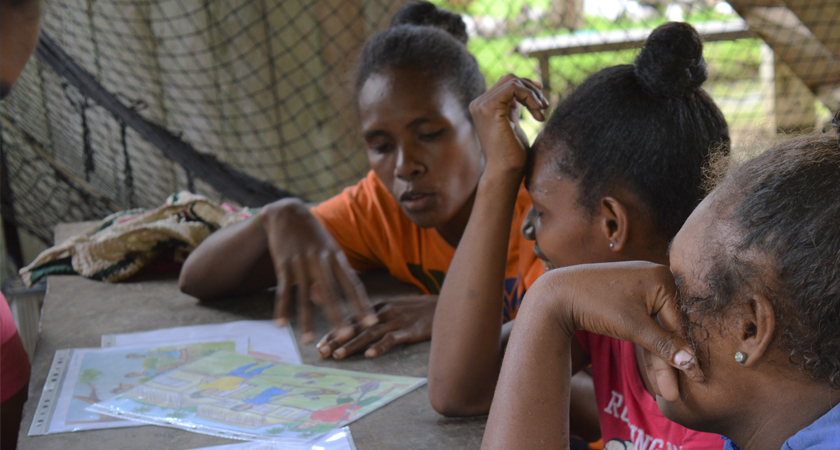
- Research project
- – Western Pacific
The partnership between the International Water Centre (IWC), Solomon Islands National University (SINU) and London School of Hygiene and Tropical Medicine partnerships reached an exciting milestone this month with the release of their Phase 1 Research Report on safe Child Faeces Management (CFM) in the Solomon Islands.
The safety of CFM is particularly relevant in the Solomon Island where diarrhoea is a leading cause of childhood mortality, causing almost 25% of childhood deaths. Child malnutrition and stunting affects 33% of children, and of the 80% of the population living in rural areas, there is still 80% open defecation and only 16% have a handwashing facility with soap.
According to IWC Project Officer, Water Sanitation and Hygiene, Rosie Sanderson, the formative research helped the team to better understand the knowns and unknowns of CFM in five selected villages from provinces where Community-led Total Sanitation (CLTS) implementation had occurred previously.
“Child faeces management is a routine behaviour, and often undertaken by parents without much conscious and planned thought, “Rosie explains.
“Rather, parents are motivated by a desire to look after their children (nurture) and for them to be happy and healthy. Parents tended to be disgusted by the poo of others and by the thought of their child (or a dog) coming into contact with the poo, but not so much specifically having to deal with the poo of their own children.”
“From a behavioural perspective, this meant parents tended to move the poo from the ground where the child defecated, to somewhere else out of the way – though that “out of the way” place was not always safe – the mangroves, the beach, the stream, or at the base of the bananas in the garden.”
While it is acknowledged that hygiene practices, including handwashing, are an important part of safe CFM, the target behaviour for this project was for child faeces, where possible, be moved to a latrine or toilet. This option is considered to be the safest by the World Health Organisation (WHO) and have broad consensus with experts globally.
“Some parents already practice safe CFM, and our challenge is to motivate more parents to do this and to normalise this behaviour,” Rosie said.

The formative research also explored how fathers were involved in CFM and what sorts of social, environmental, and epistemological barriers might hinder their involvement.
The project explicitly recognised that promoting changes to how families manage their children’s sanitation could, if not appropriately considered and enacted, increase women’s domestic workloads and/or contribute to the risk of Gender-Based Violence perpetrated by men if domestic gender norms are challenged.
Rosie said the team conducted the research activities separately with mothers and with fathers and determined that safe CFM can be promoted as an issue for parents because nurturing and looking after their children were considered a high priority for both mothers and fathers.
The formative research has revealed there are several levers that could be employed to support behaviour change in safe faeces disposal as part of safe CFM, including:
The findings have already been shared with the Solomon Islands Sanitation Working Group convened by UNICEF and RWASH (Rural Water, Sanitation and Hygiene, under the Ministry of Health and Medical Services), and the feedback was great with the working group members discussing the gap in the sanitation approach related to CFM and what could be done about it.
“There was broad support for incorporating the findings of our research into their community engagement approach, and we are currently preparing an integrated package of activities that use the behavioural levers.”
The team will be presenting their findings at the UNC’s Water and Health conference in October.